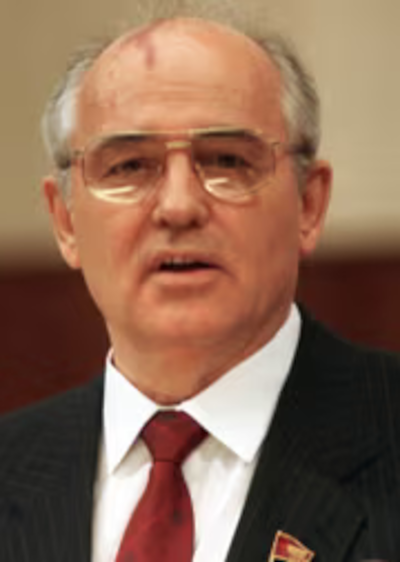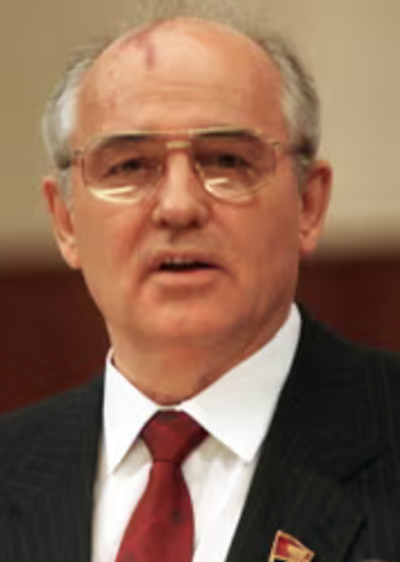


Mikhail Gorbachev (1931–2022) was a Soviet politician and reformist leader who served as the General Secretary of the Communist Party of the Soviet Union from 1985 until 1991 and as the last head of state of the Soviet Union, serving as its first and only president from 1990 until its dissolution in 1991. Gorbachev is best known for his significant role in ending the Cold War, implementing policies of glasnost ("openness") and perestroika ("restructuring"), and overseeing the eventual collapse of the Soviet Union. His leadership transformed global geopolitics, though his legacy remains mixed, as many in Russia blame him for the collapse of the Soviet Union and the economic turmoil that followed.
Birth and Family Background: Mikhail Sergeyevich Gorbachev was born on March 2, 1931, in Privolnoye, a small village in the Stavropol region of southern Russia (then part of the Soviet Union). His family were peasants, and he experienced the harsh realities of life under Stalinist rule, including the forced collectivization of farms and the Great Purge. Despite these hardships, Gorbachev excelled academically and developed a deep interest in politics at an early age.
Education and Early Political Career: Gorbachev studied law at Moscow State University, where he joined the Communist Party of the Soviet Union (CPSU) in 1952. During his university years, he met his future wife, Raisa Titarenko, with whom he would have a close personal and intellectual partnership. After graduating in 1955, Gorbachev returned to the Stavropol region, where he quickly rose through the ranks of the local Communist Party leadership.
Regional Leadership and Reforms: Gorbachev's political career advanced steadily in the 1960s and 1970s. He earned a reputation as a competent and reform-minded leader, particularly for his work in agricultural policy and economic management in the Stavropol region. His successes in managing regional development projects caught the attention of senior party officials, including Yuri Andropov, who became a key mentor to Gorbachev.
Entry into National Politics: Gorbachev moved to Moscow in the 1970s and became a member of the Central Committee of the Communist Party. In 1979, he joined the Politburo, the highest decision-making body of the CPSU. After the deaths of Soviet leaders Leonid Brezhnev, Yuri Andropov, and Konstantin Chernenko in quick succession, Gorbachev emerged as the new leader of the Soviet Union. On March 11, 1985, at the age of 54, he became General Secretary of the Communist Party, marking the beginning of his leadership.
Glasnost ("Openness"): Gorbachev introduced glasnost, a policy aimed at increasing transparency in government institutions and promoting freedom of expression. This policy allowed for greater openness in Soviet society, including freedom of the press, the airing of public grievances, and the lifting of restrictions on the discussion of Soviet history. Glasnost also led to the exposure of government corruption, historical abuses, and human rights violations, including those under Stalin. The policy helped foster a culture of political pluralism and dissent, which, although liberating for many, also destabilized the Soviet system.
Perestroika ("Restructuring"): Gorbachev's economic policy, perestroika, sought to reform the Soviet economy by introducing elements of market-based mechanisms and decentralizing economic control. The Soviet economy had stagnated under the centralized, command-style economy of the Brezhnev era, and Gorbachev aimed to revitalize it by allowing for limited private enterprise, reducing state control over industry, and encouraging foreign investment. However, perestroika faced significant resistance from hardline communists and failed to produce the desired economic recovery. The reforms led to shortages, inflation, and growing economic discontent, exacerbating the already precarious state of the Soviet economy.
New Thinking in Foreign Policy: Gorbachev's foreign policy, often referred to as "new thinking," was based on reducing Cold War tensions and seeking peaceful coexistence with the West. He sought to reduce the Soviet Union’s military commitments, curb the nuclear arms race, and foster better relations with the United States and Western Europe. This approach was a radical departure from the confrontational policies of his predecessors.
Summits with Ronald Reagan: Gorbachev's relationship with U.S. President Ronald Reagan was a key factor in ending the Cold War. The two leaders held a series of landmark summits, beginning with their first meeting in Geneva in 1985. Their most significant breakthrough came at the 1986 Reykjavik Summit, where they discussed deep reductions in nuclear arsenals, though the summit ultimately failed to reach a comprehensive agreement. In 1987, Gorbachev and Reagan signed the Intermediate-Range Nuclear Forces (INF) Treaty, which eliminated an entire class of nuclear weapons and marked a turning point in Cold War relations.
Withdrawal from Afghanistan: Gorbachev also initiated the withdrawal of Soviet troops from Afghanistan, ending the nearly decade-long Soviet-Afghan War, which had become a costly and unpopular conflict. The withdrawal, completed in 1989, was a significant step toward reducing Soviet military involvement abroad.
Eastern Europe and the Fall of the Berlin Wall: Gorbachev’s reforms and his decision to reduce Soviet interference in Eastern European affairs contributed to the collapse of communist regimes across the Eastern Bloc. In 1989, a wave of democratic revolutions swept through Eastern Europe, leading to the fall of the Berlin Wall and the reunification of Germany in 1990. Gorbachev’s refusal to use Soviet military force to suppress these movements was a decisive moment in the peaceful end of the Cold War.
Growing Domestic Unrest: Despite his efforts to reform the Soviet system, Gorbachev’s policies of glasnost and perestroika unleashed forces he could not control. Economic hardships, ethnic tensions, and political dissent grew throughout the late 1980s. Nationalist movements gained momentum in several Soviet republics, particularly in the Baltic states of Estonia, Latvia, and Lithuania, which demanded independence.
August 1991 Coup Attempt: In August 1991, hardline communists attempted a coup to remove Gorbachev from power and reverse his reforms. Gorbachev was placed under house arrest in his vacation home in Crimea. However, the coup failed due to widespread public opposition and the leadership of Boris Yeltsin, the president of the Russian Federation, who rallied support against the coup. The failed coup severely weakened Gorbachev's authority and hastened the disintegration of the Soviet Union.
Dissolution of the Soviet Union (1991): By the end of 1991, the Soviet Union was on the verge of collapse. On December 25, 1991, Gorbachev resigned as president of the Soviet Union, acknowledging that the Soviet state no longer existed. The next day, the Soviet Union was officially dissolved, and 15 independent republics emerged from its former territory, with Russia as the largest successor state.
Political Activities After the Soviet Union: After the collapse of the Soviet Union, Gorbachev remained active in public life, though his influence diminished significantly. He founded the Gorbachev Foundation, a think tank dedicated to the study of social and political issues, and the Green Cross International, an environmental organization. Gorbachev also ran unsuccessfully for the presidency of Russia in 1996, receiving less than 1% of the vote.
Global Recognition: Despite being largely unpopular in post-Soviet Russia, where many blamed him for the collapse of the Soviet Union and the ensuing economic hardships, Gorbachev was widely admired in the West. He received numerous awards and honors, including the Nobel Peace Prize in 1990 for his role in ending the Cold War and reducing nuclear tensions. He continued to speak out on global issues, including environmental concerns, nuclear disarmament, and democratic governance.
Views on Putin's Russia: In his later years, Gorbachev was critical of some aspects of Vladimir Putin's leadership, particularly the rollback of democratic reforms and the increasing centralization of power. However, he also supported Putin's efforts to restore Russia's global influence and opposed Western attempts to isolate Russia.
Death: Mikhail Gorbachev passed away on August 30, 2022, at the age of 91. His death marked the end of an era, as he was the last surviving leader of the Soviet Union.
Historical Significance: Mikhail Gorbachev is regarded as one of the most transformative figures of the 20th century. His policies of glasnost and perestroika opened the Soviet Union to greater political and economic freedoms, and his foreign policy helped to bring about the peaceful end of the Cold War. His refusal to use force to maintain Soviet control over Eastern Europe was a crucial factor in the peaceful revolutions that ended communist rule in the region.
Mixed Legacy in Russia: In Russia, Gorbachev’s legacy remains controversial. While some praise him for ending the Cold War and introducing democratic reforms, others blame him for the collapse of the Soviet Union, the economic chaos of the 1990s, and the loss of Soviet power and prestige. His role in reshaping the world, however, is unquestionable.
Global Legacy: Internationally, Gorbachev is celebrated for his role in reducing the threat of nuclear war, promoting peaceful diplomacy, and helping to reshape the geopolitical landscape of the late 20th century. His vision of a more open, democratic, and cooperative world left a lasting impact on global politics.
Mikhail Gorbachev’s leadership transformed both the Soviet Union and the world. His efforts to reform the Soviet system, promote openness, and reduce Cold War tensions helped to bring about an era of greater international cooperation and the end of the Cold War. While his legacy is viewed with complexity in Russia, his impact on global history is profound and enduring. Gorbachev's vision for a more democratic and open society, even if it ultimately led to the dissolution of the Soviet Union, reshaped the course of world history and left a lasting imprint on the 20th century.

We use cookies
We use cookies and other tracking technologies to improve your browsing experience on our website, to show you personalized content and targeted ads, to analyze our website traffic, and to understand where our visitors are coming from. Privacy Policy.